According to the BoardGameGeek, the end of June marks my 13th year as a member. So rather than my sort-of-annual Top Ten or whatever, I think this year I'm going to do a list of 13 games that I love. And rather than ranking them or ordering them, I'll just go in alphabetical order - because while I could order them, I love them all for one reason or another and what might get pulled out and played could vary for a lot of reasons.
Combat Commander
I've mention this as one of my all time favorites many times over. Not only is this an incredible squad level war-game, it tells a narrative like few other games ever have for me. When I look back at 13 years of hobby gaming, most of the vivid game memories I have involve this game. If you felt sucked into Saving Private Ryan well, this game is like playing the movie as a game. I understand that this may not be for everyone, but for whatever reason this game is special to me. It is one of those games that I don't always think to suggest, but the second I start playing it, I wonder why I don't play it more.
Now, when I say Combat Commander, I really mean - Combat Command:Europe and Combat Commander: Mediterranean. They are two parts of the whole game. For the most part, the other expansions are just an extensions or groupings of scenarios with a bit of extra content. I absolutely do not mean Combat Commander: Pacific - in Pacific they changed when the random events happened, which made it into a a much more "system" war-game that didn't have the same drama whatsoever. It is really a very small change, but it was noticeable and just not my thing. War is supposed to be chaotic and crazy and frankly, a bit of the chaos is why CC:E is too good.
Crokinole
I am lucky enough to not only own a Hilinski board, but one of their boards that has wooden pegs (they switched and started doing metal pegs rather than making the pegs for the boards). The picture here is of my board - Notorious.
For those that are not familiar with Crokinole, it is a dexterity/skill game played on a large wooden board. The surface is very smooth and slick and players take turns flicking small disks around the board. At the end of a round, any of the player's disks which have remained on the playing surface are scored based on their location. Therefore, on a player's turn they are attempting to either position their pieces near the center (by launching from the edge of their play area), or attempting to move the other player's pieces from the board (like shuffleboard). It may sound a little dull, but it isn't. It is fast and takes a fair bit of skill. Against players of similar skill levels, the games are quite tense as players take turns making amazing shots.
This can be played either head-to-head or in teams - team games are great fun. Not only is the game really excellent, but the board like this is a generational item. Someday this will belong to my daughter and become a part of her family.
Eldritch Horror
What is Eldritch Horror? It is a Cthulhu/Lovecraftian themed co-op. Readers of this blog probably already know - I'm really not a co-op guy. I'd rather play something where I get to outplay the other players than play a game where some Alpha player tells everyone what to do. EH is not that kind of game.
Eldritch Horror is story. It is almost a choose your own adventure (remember those books?) story except that multiple players are experiencing a common CYOA and their stories are just part of a larger narrative. This single narrative (and a cleaner set of rules and gaming experience) is what make this game a huge leap forward over Arkham Horror, which I find tedious and boring. If you aren't interested in the theme, you won't care much for this game. If you like the theme, then you will probably love being a part of the narrative as you battle strange monsters, cultists, and a never ending sense of spreading doom across the world.
A Game of Thrones
I was introduced to the AGoT books very randomly as a recommendation by a Borders employee. I found the series amazing. Later, I discovered boardgames and one random day, I found a copy of the first edition AGoT:TB at Barnes and Noble for 75% off. I literally knew nothing about the game, but it was cheap and looked cool. I read through the rules and thought that this was going to be fun. I got four other guys to play one night (the original game was 5 player) and I was blown away at how good this game was. It was (and is) amazing. I immediately found the expansion (6-players and ports!) and have enjoyed this game, the expansions and revisions since.
First, forget the theme of the game. Sure, it adds a good amount of flavor if you are familiar with the material, but the game and its systems are what make this game amazing, not the setting. This is a battle for control of the world of Westeros. It is amazing because the way the game is setup, you are in conflict from all sides from the second you start the game. And no, you will not have the ability to go it alone - or if you do, you have to be amazing at staying out of the way of the other players. You are going to have to create alliances and at some point stab someone in the back before they stab you. But again, this is more than just a "Diplomacy" game. You have limited resources and you need more if you want to rule. How you manage those resources dictates how you compete in all phases of the game. You may not have the most armies, but if you wield control of the right things in this game, you may have the kind of influence that will keep others off your back by granting them favors against your strongest enemies.
I have never played a game where six asymmetrically different factions were so well balanced and the various control systems in the game were also so well balanced. The game doesn't tell a story, the gameplay and the experience are the story. The fact that theme material is based on a story that I really enjoy is icing on the cake.
Kingdom Builder
If you based what I like on the games on this list so far, you'd think that I need a great story or narrative to love a game. Wrong! Kingdom Builder is an amazing game that is one of my all time favorites. Why? Well, because despite being fairly simple (no matter what you add in terms of expansions, the complexity really doesn't change much) it is a wonderful puzzle game. That is to say - the player that does a better job (tactically) of figuring out how best to score is the one that wins. Because of the variability in what scores and what actions are available from game to game and a small bit of randomness in where you can place each turn, the puzzle is always new and fresh. And really, that's all that this is. It is fast, accessible and clever - without anything that might be called a story or even a theme.
Legendary: A Marvel Deck Building Game
And now that I'm done telling you that I don't need a story and theme in a game, let me tell you about this one. For those that have been keeping up with this blog, you already know that this is another of my favorite games. It is a deck-builder pure and simple. You and your friends against the system, but it is only loosely a co-op. Really, whether the "game" wins or not doesn't matter. Who scored the most points matters.
Once upon a time, I would have said that a big reason that I loved this game was the theme. I really enjoy Marvel comics and I read them a lot as a child and still do read comics from time to time. This game is a fun way to re-play some of the classic Marvel storylines and create your own hero team-ups to do so. But here's the thing. The game was re-done in electronic form with a completely different (fantasy) theme. Guess what? The game was still amazing. It is just a well oiled engine for a deck builder. Yes, some combos are unbalanced (for or against you), but the game still entertains me. And yes, despite how easy it is to play on my tablet, I still have a (very) full box of Marvel Legendary stuff that I pull out and play from time to time. Really, the setup and teardown efforts are the only big complaint I have with the game.
Orléans
In the last year and half, this has become one of my household's favorite games. Orléans is a bag-builder-euro (which means that instead of a deck of cards, you put your stuff into a bag a randomly draw things from the bag each round) and the reason that we like it so well is that there are lots of different ways to score points. That being said, it doesn't feel like a Feld point salad - it feels more cohesive for some reason that I cannot explain. We've acquired a number of the mini-expansions, which give us a fair bit of variability in the buildings that are available each game, which has kept us from pursuing any one dominant strategy. We also really like that it seems to scale well from 2-4 players and aside from setting up and putting away a bazillion pieces, the game itself plays pretty quickly for us - we can play back to back 2-player games in just over a couple of hours.
Power Grid
Whether you love or hate Power Grid doesn't matter - I love it. There are a lot of complaints that this game is just an exercise in math. Wrong (well, there is a bunch of math, but there is math in a lot of games) - this is an auction game and a positioning game. People that dislike this game tend to dislike that they can't figure out how much to pay for a power plant. Hey guess what? You can go play that crappy offshoot of this game - First Sparks (aka Power Grid for Dummies) if you don't like the auction. This is an amazing game that pits the players against each other the whole time. Positioning in turn order and placement on the map change each game and it is in understanding those two things and the other players at the table that determine the value of the power plants. Maybe that's why this game shines for me - winning truly means having bested the other players, not having played the game system better than other players. That distinction is small but important and what makes this an amazing game.
Samurai
This game took me a lot of playings online (it used to be part of MaBiWeb.com) before I saw how great this game was. This is an abstract game for sure, and other than the initial layout of the game and the order that you receiver the orders you can place each turn, there isn't a bunch of variability. This is another game where you best the other players by playing better than they did. Interestingly, this is a game that has no expansions or different maps. What I find the most interesting about this game is that your approach to the game depends on the number of players. The things you try to do in a two-player game are different when there are three players and different again with four players. Because the game isn't a perfect information abstract (there is randomness) and because there is not a good way to handicap the game, it does suffer if all the players aren't of a similar experience / ability level. But when players know the game, it is a great fight.
Steam: Rails to Riches
Once upon a time, Martin Wallace made a train game called Age of Steam and heavy-euro fans had a great time. Then, whether because he wanted to clean-up the system or because of a legal fight with Winsome games (the original publisher), Martin revised his game into Steam.
The revision met with mixed reactions. Die-hard AoS fans disliked that the new game felt too easy and watered down, while those that wanted to like AoS, but found AoS to be frustrating for new players and too long to play really liked the new system. While I loved AoS, I really liked the changes. Things felt more streamlined and less cobbled together. What changed? The auction for turn order/actions went away and was replaced by an action selection system that determined player order. The money system was also made more accessible and some of the fiddly oddness regarding the way debt impacting earnings was changed into a form that is much more understandable for players. There are a couple of other changes, but fundamentally, the building track and moving goods portion of the game was essentially the same. All in all, Steam became much more accessible than AoS had been, and (in my mind) was still just as fun, just not as "hard". It scratched the same itch, but could be introduced to new players. For players that have not had a chance to play this kick-ass game, there are electronic forms that are really well done and if you have the chance, you should grab a copy and play.
Tichu
I grew up playing cards in my family. Lots of Pinochle, Spades, Euchre, Oh Hell! etc. I love trick taking games. When I was first introduced to Tichu, a whole new world opened up to me (Tichu is a ladder/climbing game, which is similar, but different than trick taking). Why is Tichu so good? Well, if you simply said it is like a trick-taking-partnership game, you'd have sold me. But saying that isn't enough. One of the reasons that Tichu is so good and has more tension than other trick takers is the gamble - calling Tichu. Calling Tichu is done before you play your first card and if you go out first, your team gains 100 points. If you fail to go out first, you lose 100 points (hands score a total of 100 points between the teams based on the tricks you take, so the bonus is a decent reward). The other reason that Tichu is so fascinating is in how you play cards. You can play single cards, pairs, triples, full houses, runs of 5+ cards, and super sets (called bombs) - straight flushes and four of a kinds. On top of that, there are 4 special cards. All together, the experience is different from other card games where you want all the tricks.
Ticket to Ride
There is a really good reason that Ticket to Ride has sold millions of copies and expansions on its way to becoming the gateway game franchise. Ticket to Ride is just that good. The game mechanics are simple (and even the expansions and different maps generally only add a small amount of new complexity) and easy to understand - on your turn you have three simple options and you do one of those things and then its the next player's turn. Short turns keep all the player's involved and what is fascinating is that despite this simplicity, the game is entertaining for experienced gamers and non-gamers alike.
For me, I like that I can get anyone (including my kids) to play this game with me and I don't feel like I'm settling on something just so we are playing together. I also like the huge number of maps and variants AND that all of this is available in electronic form. Bonus - the online version of the game is excellent and one of the best implementations of a boardgame ever.
Viticulture
Coincidently, Punchboard Media has an "essentials" game list being put together (read here), and Viticulture is on the list, so I already had a write up for this game (though this might beat that particular article to the internet)!
Viticulture is a Top 10 game for me and easily my favorite worker placement game, but - not plain vanilla Viticulture. This is an odd game in the way that it was released and re-released, and re-done with different versions having different expansions etc. When I refer to Viticulture, I do not mean anything less than Viticulture Essential Edition, and in my head, I really mean Viticulture Collector’s Edition (which is Viticulture + 80-billion Tuscany expansions). The reason for all these variations in releases is a long side story about promising kickstarter backers not to re-publish a particular version of the game, which I don’t think they do anymore.
Anyway, at its core, vanilla Viticulture is an ok worker placement game that is flawed by a couple of problems: everyone starts in the same place and is trying for the same things, which makes luck of the draw heavily influence the game (there are a lot of types of cards and they play a large part of the game, but when there is only one path to playing (at least at the start), it makes early draw luck important). This type of worker placement game (where everyone is just fighting to do the same thing in the beginning. ie you have to get that extra worker early on, because an extra action/turn is so important - if I have to do A-B-C to viably compete, just start the game there and don't make me go through those steps) is the main reason I don’t love a lot of WP games - I hate having to play a certain way. I hate when there are only a couple of viable paths to winning or scoring points.
Fortunately, a couple of expansions changed the game (for the better) and were packaged together to create what became the Essentials edition. What the changes did was make the starting state for each player variable, which meant that each player could approach the early game differently. By adding in a number of other expansions, you dramatically increase the ways that players could score points, and thus changed the paths to winning. Now, instead of having to do and acquire the same things (extra workers, money, buildings) at the same time as everyone else, players had options. Now you have a worker placement/engine game that was more tactical and fluid and had the luck of the draw much more evenly spread out. Players can easily see a LOT more cards, which meant a lot less frustration. Even if one type of card drawn frustrated you, you could trade those for money or points or other cards or grapes, etc. In fact, you can win the game never making wine. And while this is a game about running a wine business, the things you are doing to win are parts of all the other things around the business. It is a well married theme and with the full set of expansions available, you can make the game as complex or different from game to game as you want. Maybe you don’t make the wine, but you just grow grapes and sell them and give tours to tourists (and sell cheese and olives in your tasting room). I also like how well the game plays regardless of player count. I’ve played a fair number of 2-player games of Viticulture and we love it as much at that count as with 4-5 players.
And there you have thirteen of my favorite games! Be sure to check us out at PunchBoard Media!

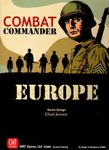

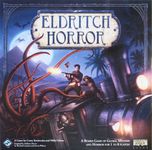
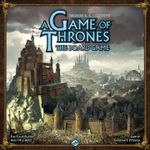
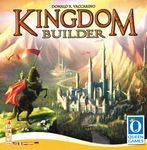

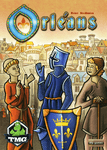
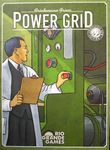

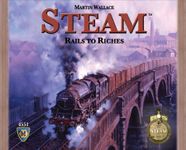
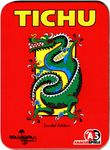
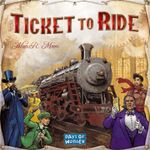
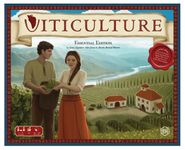

No comments:
Post a Comment